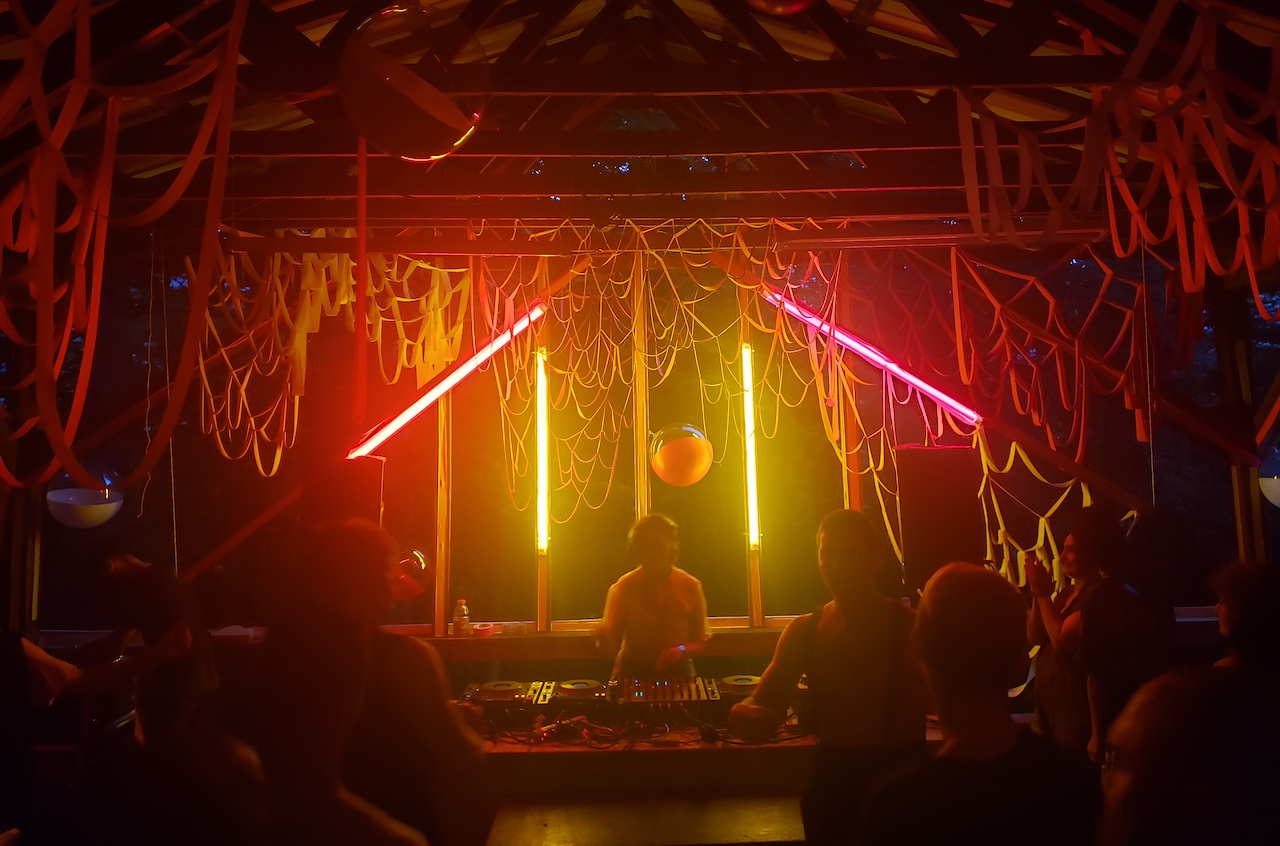- Andrew Ryce travels deep into Pennsylvania for one of the best queer parties on the planet.
- One of the first things I noticed pulling up to Honcho Campout was the number of DJs booked for last year's edition who had returned just to hang out. That's because anyone who attends becomes part of a community: a tight-knit, queer-centric, open-minded and compassionate group of people who love dance music. What Honcho Campout offers in North America is similar to what festivals like Freerotation and Nachtdigital provide in Europe: a weekend of art, music and community spirit that feels enriching and rejuvenating, in spite of the intense partying. But it's different because it's queer (truly queer, with more groups represented than ever this year), which lends the gathering an atmosphere of acceptance and support. Sure, dance music is supposed to be for everyone, but I've never seen such a wide spectrum of people—trans, non-binary, black, white, Asian—at a festival as small and humble.
A thoroughly DIY affair with no sponsors or corporate presence, Honcho Campout, which takes place on a family-owned "interfaith sanctuary," grew responsibly this year, though it's still intimate for a festival, hovering around 900 people. Aside from the crowd, the best thing is the element of surprise. The festival focuses on spotlighting lesser-known queer artists and crews from around the US and the rest of the world, DJs who make waves in their local communities but might not get international recognition. These artists tend to feel encouraged at Honcho, so they play sets outside their comfort zone. That, coupled with this year's policy of only booking DJs who had never played at the festival before, meant that there were plenty of surprises. Some of my favourite sets came from DJs who were new to me.
The programme included more than DJ sets. The lecture series returned this year, covering topics like "decolonizing the dance floor" and "queer psychedelics," plus a talk between Jackie House and Steve Fabus, a legend of the San Francisco disco scene. Fabus closed the festival with a surprise appearance, playing an emotional run of classic disco that briefly made Honcho Campout feel like one of those golden-age gay men's retreats of the '70s. But it's not that, and that's part of why it's so wonderful. It's the future: diverse, welcoming and inspiring.
Here are five key performances from across the weekend.
Rachel Noon
Rachel Noon is a resident at New York's UNTER, a queer-leaning party known for its love of hard techno. For her opening set at the Stone Circle stage on Friday, she DJ'd in a visor against a forest backdrop. The scene was retro-futurist and so was the music. She played a delicate but powerful mix of tranced-out techno and electro that was hard to pin down to any one era. The sounds were gilded, glowing and fluid—the best descriptor I could muster was "forest trance." The mixing was disciplined, proof that the skills needed for blending hard-as-nails techno could be transferred into a slower style. Beautiful in combination with the sunset, her performance paved the way for Aurora Halal, who launched straight into a blast of techstep drum & bass.
CarrieOnDisco
Carrie Morrison is one of those DJs who was barely on my radar before Honcho Campout. A regular on the San Francisco club circuit and a resident at Pound Puppy, she plays disco, as you might have guessed from her name. At Hemlock Hole on Friday afternoon, she served up a life-affirming set, combining edits with unabashed classics and gospel-inflected joy, including a jubilant closing track—a live version of DJ Oji & Una's "We Lift Our Hands At The Sanctuary"—that triggered the first of many collective emotional releases from the crowd across the weekend.
Madison Moore
Another highlight from Hemlock Hole was Madison Moore, a Richmond-born academic with a PhD in queer studies who is known for a party called Opulence and a book about queer nightlife titled Fabulous. He calls his style of techno "dark and sickening," which made for a delightfully sinister turn on Saturday afternoon after Oscar Nñ's set of Y2K party classics. Decked out in a sequinned bunny suit, Moore let loose fast tracks with rippling leads that felt like they were aimed square at the dancers in front of him. It was like an evil version of the beautiful trance being played elsewhere, another example of Honcho Campout giving you what you wanted when you least expected it.
Andrea Paz
Chilean Andrea Paz is the latest addition to Honcho's growing South American contingent. Known for throwing parties in creative spaces—including a huge tunnel beneath the streets of Santiago—and running the Discos Pato Carlos label, she has a sound somewhere between contemporary techno, Cómeme and the kind of leftfield, low-BPM music Lena Willikens plays. Paz was one of the first up at the Open Haus afterhours, generally a place for high-octane techno and all-night dancing. She went straight on the attack, crashing tracks together in head-on collisions. But her set turned brighter with Ultra Naté's "Free," a '90s house classic that felt like a ray of sunshine at 3 AM. Followed by other classics like Anita Ward's "Ring My Bell," her performance felt specially engineered for Honcho, trading darkness and light for the perfect balance of hedonism and positivity.
CCL
CCL's set was the talk of the festival before it even happened. The Seattle artist was given a heady slot (4 AM through 9 AM) on Saturday morning at The Way In, a small afterhours stage bathed in neon light curated by the In Training crew. Focusing on bass-heavy sounds, the stage drew remarkable sets from Physical Therapy, Davis Galvin and Farplane, who seemed to feed off its witchy energy. But it was CCL who best captured the stage's special vibe, starting with floaty breakbeats before traversing through dubstep and other odd rhythms. Almost every track received cheers from the audience, a kind of call-and-response between crowd and DJ that made it feel as private as sitting in someone's living room. The set peaked when they dropped the extended mix of Kate Bush's "Running Up That Hill," whose instrumental runs and ghostly vocal samples made it feel like an inside-out version of the original. The final track, Beat Happening's "Godsend," caused perhaps the most emotional, vulnerable and tear-jerking moment in a weekend full of them. As Physical Therapy tweeted, "Never quite seen anything like the moment when every single person on the dance floor burst into tears at 9 in the morning at the end of CCL's set at Honcho Campout."
Photo credits /
Ryan Michael White - Lead, CarrieOnDisco, Maddison Moore, Andrea Paz, CCL
Vovotte Recto Verso - Rachel Noon
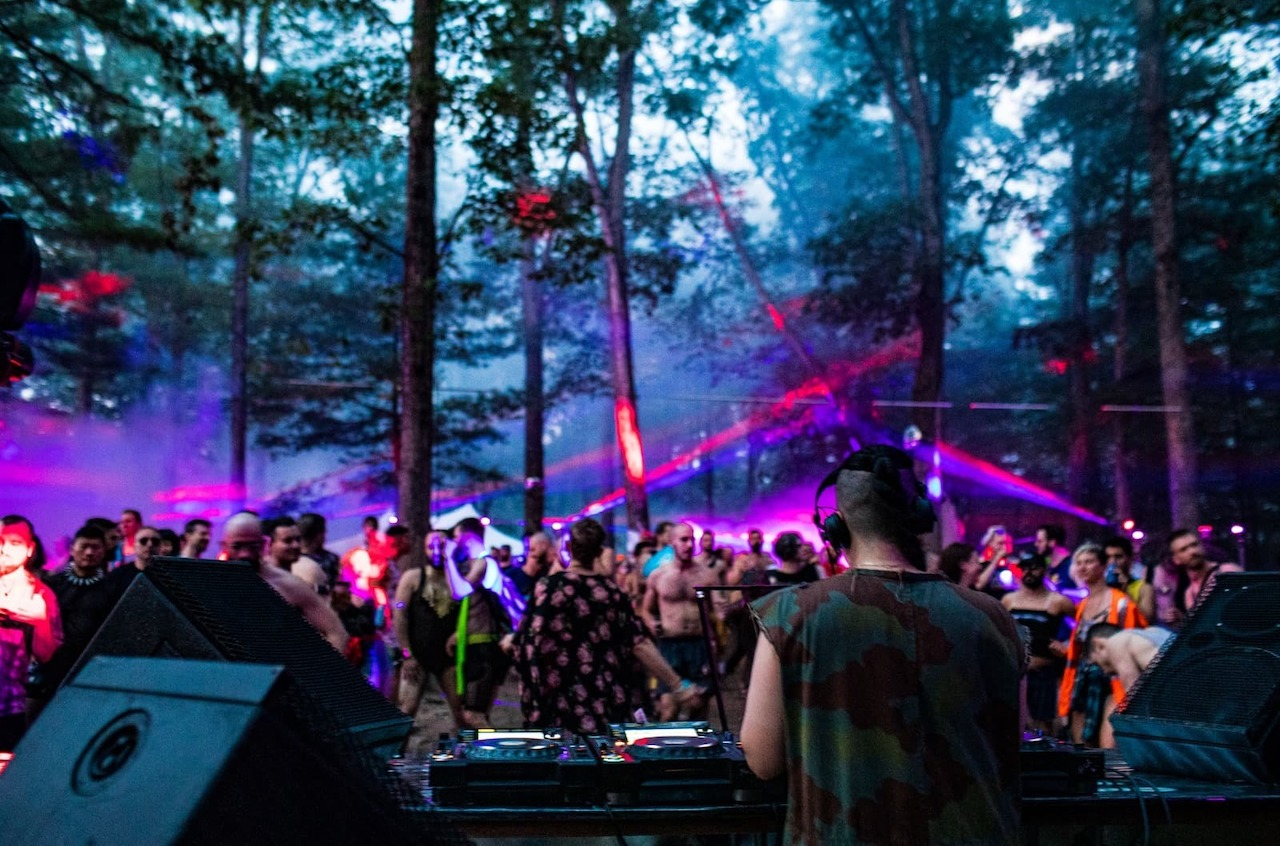 CarrieOnDisco Carrie Morrison is one of those DJs who was barely on my radar before Honcho Campout. A regular on the San Francisco club circuit and a resident at Pound Puppy, she plays disco, as you might have guessed from her name. At Hemlock Hole on Friday afternoon, she served up a life-affirming set, combining edits with unabashed classics and gospel-inflected joy, including a jubilant closing track—a live version of DJ Oji & Una's "We Lift Our Hands At The Sanctuary"—that triggered the first of many collective emotional releases from the crowd across the weekend.
CarrieOnDisco Carrie Morrison is one of those DJs who was barely on my radar before Honcho Campout. A regular on the San Francisco club circuit and a resident at Pound Puppy, she plays disco, as you might have guessed from her name. At Hemlock Hole on Friday afternoon, she served up a life-affirming set, combining edits with unabashed classics and gospel-inflected joy, including a jubilant closing track—a live version of DJ Oji & Una's "We Lift Our Hands At The Sanctuary"—that triggered the first of many collective emotional releases from the crowd across the weekend.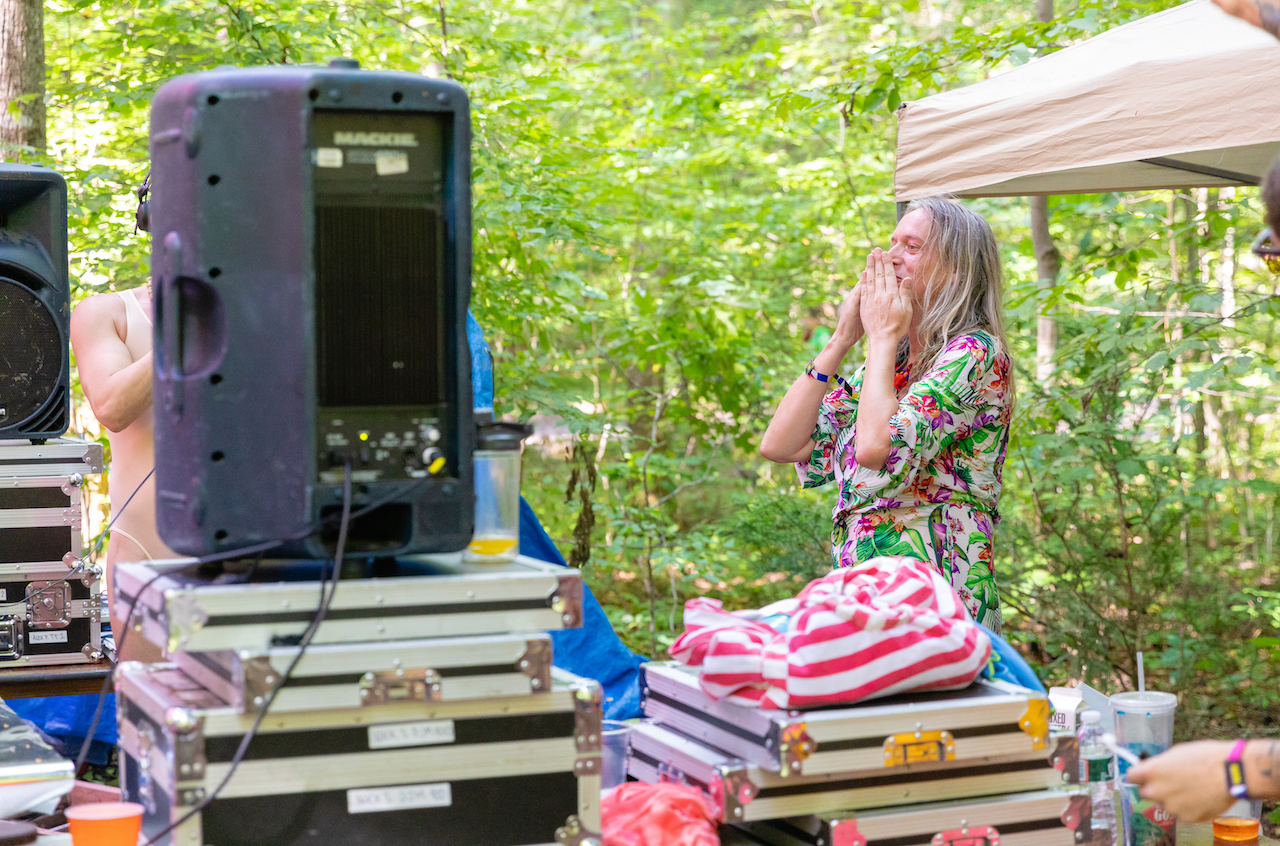 Madison Moore Another highlight from Hemlock Hole was Madison Moore, a Richmond-born academic with a PhD in queer studies who is known for a party called Opulence and a book about queer nightlife titled Fabulous. He calls his style of techno "dark and sickening," which made for a delightfully sinister turn on Saturday afternoon after Oscar Nñ's set of Y2K party classics. Decked out in a sequinned bunny suit, Moore let loose fast tracks with rippling leads that felt like they were aimed square at the dancers in front of him. It was like an evil version of the beautiful trance being played elsewhere, another example of Honcho Campout giving you what you wanted when you least expected it.
Madison Moore Another highlight from Hemlock Hole was Madison Moore, a Richmond-born academic with a PhD in queer studies who is known for a party called Opulence and a book about queer nightlife titled Fabulous. He calls his style of techno "dark and sickening," which made for a delightfully sinister turn on Saturday afternoon after Oscar Nñ's set of Y2K party classics. Decked out in a sequinned bunny suit, Moore let loose fast tracks with rippling leads that felt like they were aimed square at the dancers in front of him. It was like an evil version of the beautiful trance being played elsewhere, another example of Honcho Campout giving you what you wanted when you least expected it.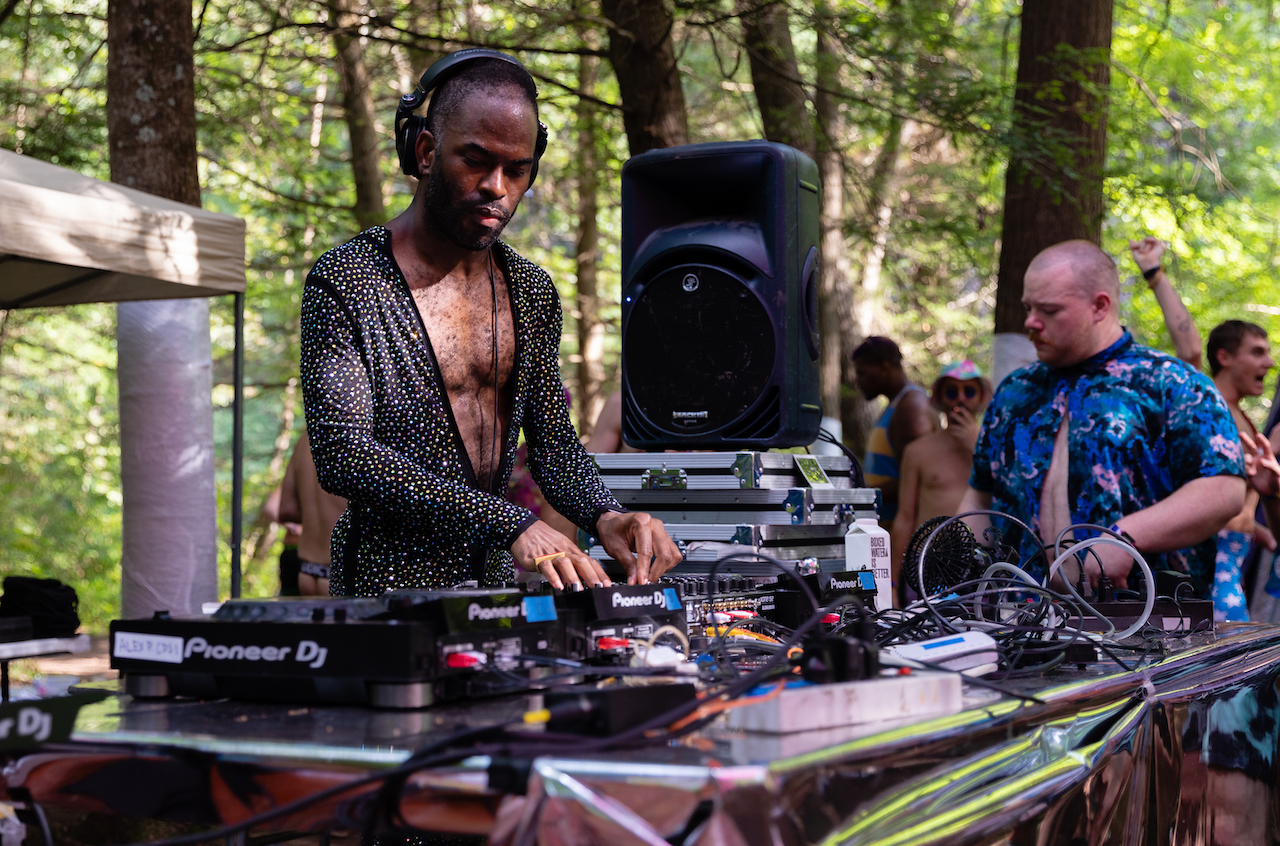 Andrea Paz Chilean Andrea Paz is the latest addition to Honcho's growing South American contingent. Known for throwing parties in creative spaces—including a huge tunnel beneath the streets of Santiago—and running the Discos Pato Carlos label, she has a sound somewhere between contemporary techno, Cómeme and the kind of leftfield, low-BPM music Lena Willikens plays. Paz was one of the first up at the Open Haus afterhours, generally a place for high-octane techno and all-night dancing. She went straight on the attack, crashing tracks together in head-on collisions. But her set turned brighter with Ultra Naté's "Free," a '90s house classic that felt like a ray of sunshine at 3 AM. Followed by other classics like Anita Ward's "Ring My Bell," her performance felt specially engineered for Honcho, trading darkness and light for the perfect balance of hedonism and positivity.
Andrea Paz Chilean Andrea Paz is the latest addition to Honcho's growing South American contingent. Known for throwing parties in creative spaces—including a huge tunnel beneath the streets of Santiago—and running the Discos Pato Carlos label, she has a sound somewhere between contemporary techno, Cómeme and the kind of leftfield, low-BPM music Lena Willikens plays. Paz was one of the first up at the Open Haus afterhours, generally a place for high-octane techno and all-night dancing. She went straight on the attack, crashing tracks together in head-on collisions. But her set turned brighter with Ultra Naté's "Free," a '90s house classic that felt like a ray of sunshine at 3 AM. Followed by other classics like Anita Ward's "Ring My Bell," her performance felt specially engineered for Honcho, trading darkness and light for the perfect balance of hedonism and positivity.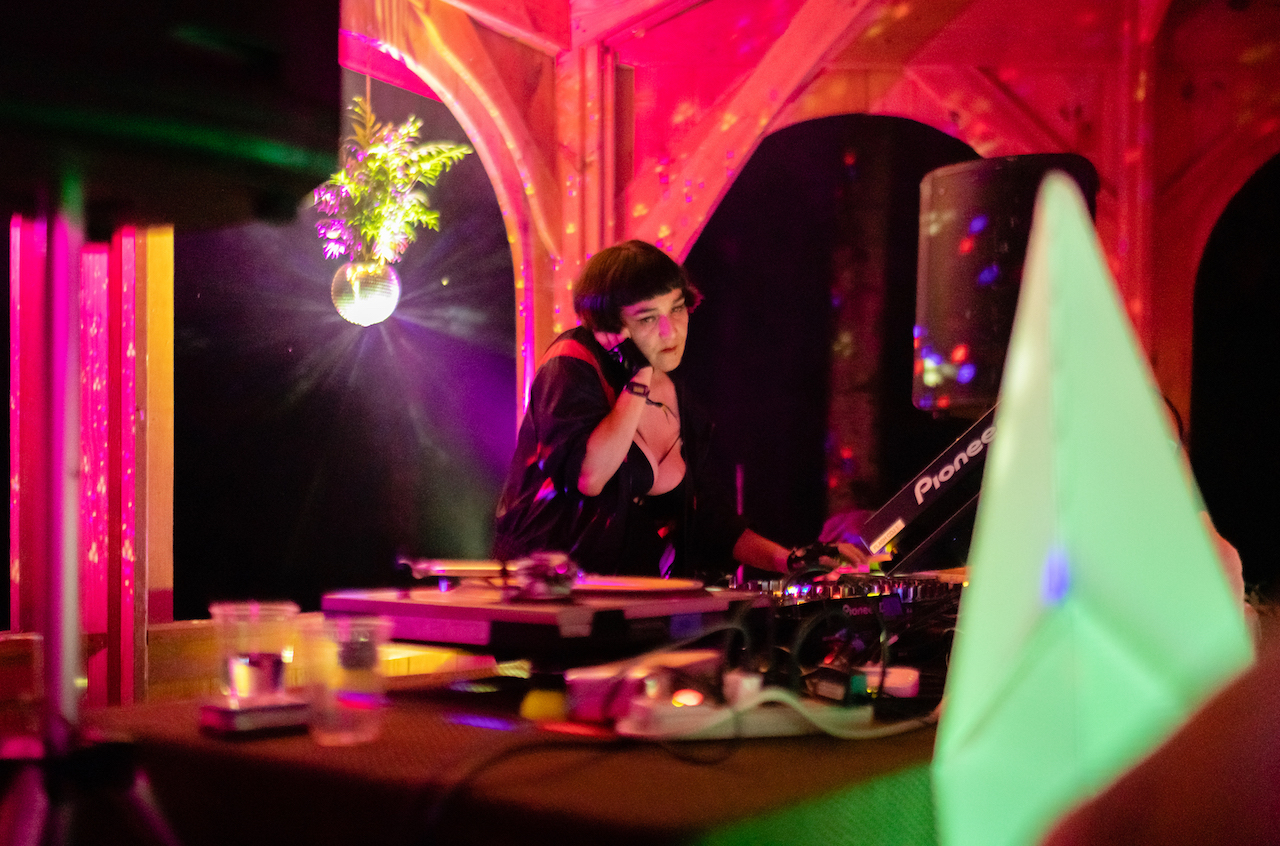 CCL CCL's set was the talk of the festival before it even happened. The Seattle artist was given a heady slot (4 AM through 9 AM) on Saturday morning at The Way In, a small afterhours stage bathed in neon light curated by the In Training crew. Focusing on bass-heavy sounds, the stage drew remarkable sets from Physical Therapy, Davis Galvin and Farplane, who seemed to feed off its witchy energy. But it was CCL who best captured the stage's special vibe, starting with floaty breakbeats before traversing through dubstep and other odd rhythms. Almost every track received cheers from the audience, a kind of call-and-response between crowd and DJ that made it feel as private as sitting in someone's living room. The set peaked when they dropped the extended mix of Kate Bush's "Running Up That Hill," whose instrumental runs and ghostly vocal samples made it feel like an inside-out version of the original. The final track, Beat Happening's "Godsend," caused perhaps the most emotional, vulnerable and tear-jerking moment in a weekend full of them. As Physical Therapy tweeted, "Never quite seen anything like the moment when every single person on the dance floor burst into tears at 9 in the morning at the end of CCL's set at Honcho Campout." Photo credits / Ryan Michael White - Lead, CarrieOnDisco, Maddison Moore, Andrea Paz, CCL Vovotte Recto Verso - Rachel Noon
CCL CCL's set was the talk of the festival before it even happened. The Seattle artist was given a heady slot (4 AM through 9 AM) on Saturday morning at The Way In, a small afterhours stage bathed in neon light curated by the In Training crew. Focusing on bass-heavy sounds, the stage drew remarkable sets from Physical Therapy, Davis Galvin and Farplane, who seemed to feed off its witchy energy. But it was CCL who best captured the stage's special vibe, starting with floaty breakbeats before traversing through dubstep and other odd rhythms. Almost every track received cheers from the audience, a kind of call-and-response between crowd and DJ that made it feel as private as sitting in someone's living room. The set peaked when they dropped the extended mix of Kate Bush's "Running Up That Hill," whose instrumental runs and ghostly vocal samples made it feel like an inside-out version of the original. The final track, Beat Happening's "Godsend," caused perhaps the most emotional, vulnerable and tear-jerking moment in a weekend full of them. As Physical Therapy tweeted, "Never quite seen anything like the moment when every single person on the dance floor burst into tears at 9 in the morning at the end of CCL's set at Honcho Campout." Photo credits / Ryan Michael White - Lead, CarrieOnDisco, Maddison Moore, Andrea Paz, CCL Vovotte Recto Verso - Rachel Noon